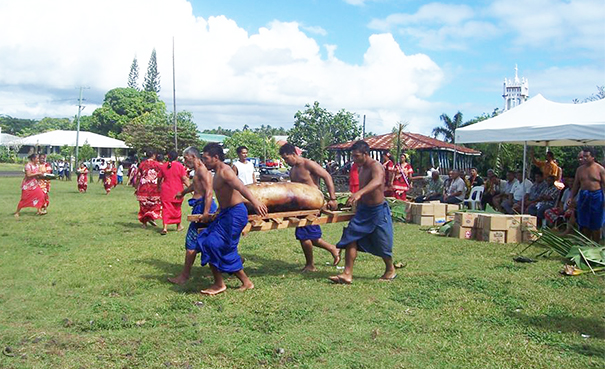By Mataeliga Pio Sioa
Traditional contributions made by families to the village council or the church commonly referred to as ‘monotaga’, appears to be in a muddle after the new amendments to the Electoral Act, passed in Parliament during the recent budget debate.
Electoral Minister Fauolo Harry Schuster defended the changes as necessary to prevent against any unfair favouritism of nominated candidates for general elections by village councils.
The new amendments allows a way around it with an ‘either or’ option for any hopeful candidates to claim ‘monotaga’ made to the church in order to be legally accepted to stand for the vote.
Cries of protests are starting to surface with one of the leading opposition MPs Lealailepule Rimoni Aiafi blasting at the direct involvement of the church.
“ There is no such thing as a religious ‘monotaga’,” Lealailepule argued.
“The ‘monotaga’ is an obligation to the village whereas for the church it is a person’s choice whether to attend the service or to give to the church.
“In other denominations they concentrate only on prayers and services, they don’t emphasise obligations such as the ‘monotaga.’
The opposition MP disagrees with the electoral amendment going against the true spirit of the ‘monotaga’ as service to the village community.
“Besides it is normally accepted that the person who provide service for the village does the same for the church.”
Lealailepule is critical of why the new amendments are to be enacted in the by-elections when that is supposed to be an extension of the April general elections.
He believed it is unfair for candidates who missed out on the general elections because of eligibility issues that are now allowed for the by-elections.
The timing of the ‘monotaga’ by back dating it to several years back, rather than the last 3 years, is another area of concern that bothered the MP.
“Why not leave the amending of the Electoral Act until after the general elections so every one can have a fresh start with the 2026 general elections?”
The criticisms continue what was heavily debated in Parliament by both sides of the political divide that went beyond into questions of residential fairness for non-village residents.
Public criticisms have also been flowing at concerns that the ‘monotaga’ issue opens the door to the risks of mixing politics and religion.
Electoral Commissioner, Faimalomatumua Mathew Lemisio, followed the debate closely and accepted the merits of the arguments from both sides.
“The religious ‘monotaga’ is a re-introduction of the traditional and religious component of the Electoral Act,” Faimalomatumua explained.
He referred to the other ‘side of the coin’ in the new amendments that makes it possible for a candidate wishing to contest the electoral constituency seat in Parliament without the village counsel approval.
“The amendments make it possible for the individual wishing to stand for election in the constituency to still run if the village council has offered their endorsement to someone else.
“ That person can claim ‘monotaga’ eligibility’ through his contributions to the church.”
What constitutes a religious ‘monotaga’ does not appear to be clearly defined as the Electoral Commissioner is aware.
The solution, however, is left with the church leaders to remedy as far as Faimalomatumua is concerned.
“The onus is on the church pastors or others who hold authority in the church to confirm for us whether the individual involved do qualify or not for the religious ‘monotaga.”
The Commissioner admitted there are still many areas that needed fine tuning with the ‘monotaga’ issue that includes residential requirements and eligibilities for candidates and voters as well.
The more problematic areas are urban-based electorates with the movements of people into residential areas that are not under traditional village council influence.
The ‘monotaga’ question is just one of the many loose ends in that area that the Electoral Commissioner believes has to be taken into account moving ahead.
